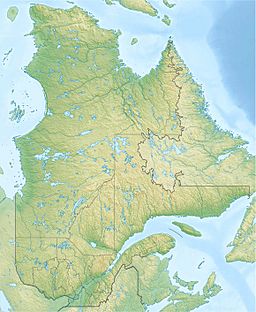Batiscan Lake facts for kids
Quick facts for kids Batiscan Lake |
|
|---|---|
| Location | Quebec in Canada |
| Coordinates | 47°21′36″N 71°55′04″W / 47.36000°N 71.91778°W |
| Lake type | Natural |
| Basin countries | Canada |
| Max. length | 6.35 km (3.95 mi) |
| Max. width | 0.5 km (0.31 mi) |
Batiscan Lake is a natural lake located in the province of Quebec, Canada. It's found in a special area called Upper Batiscanie. This lake is important because it sits right on the edge of two large protected areas. These are the Laurentides Wildlife Reserve and the Zec de la Rivière-Blanche. The lake is also near the unorganized territories of Lac-Blanc and Lac-Croche. These areas are part of the La Jacques-Cartier Regional County Municipality.
The lake is quite long and narrow. It stretches about 6.35 kilometers (almost 4 miles) long. At its widest point, it is about 0.5 kilometers (half a mile) across. It runs in an east-west direction.
Rivers and Water Flow
Batiscan Lake gets most of its water from the Croche River (La Tuque). This river flows into the lake from the northeast. The Croche River itself is fed by Lac Croche.
Water from Batiscan Lake then flows into the Lightning River. About 15 kilometers (9 miles) to the west, the Lightning River joins the larger Batiscan River.
Another important river, the Moïse River, also flows into the Lightning River. This happens right where the Lightning River leaves Batiscan Lake. The Moïse River gets its water from Moïse Lake. Moïse Lake is fed by three smaller rivers. Moïse Lake also marks a boundary. It's on the southwest edge of the Laurentides Wildlife Reserve. It's also on the north edge of the Zec de la Rivière-Blanche.
What's in a Name?
The name "Batiscan Lake" was officially recorded on December 5, 1968. Sometimes, people might confuse it with "Petit Lac Batiscan." That lake is located in a different area, near the town of Saint-Raymond.
Batiscan Lake is considered one of the main sources of the Batiscan River. This is especially true because of the Moïse River and other smaller rivers that feed into it. It's common in French-speaking Canada to name a lake after the river it feeds.
 | Delilah Pierce |
 | Gordon Parks |
 | Augusta Savage |
 | Charles Ethan Porter |


